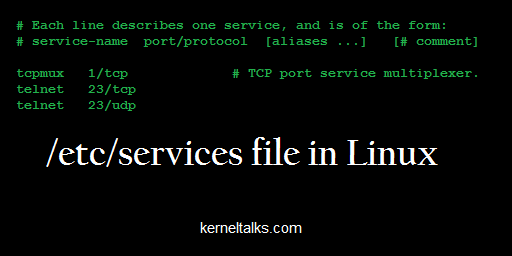The article helps you to understand /etc/services file in Linux. Learn about content, format & importance of this file.

Internet daemon is an important service in the Linux world. It takes care of all network services with the help of /etc/services file. In this article, we will walk you through the content, format of this file, and what it means to a Linux system.
/etc/services file contains a list of network services and ports mapped to them. inetd or xinetd looks at these details so that it can call a particular program when a packet hits respective port and demand for service.
As a normal user, you can view this file since the file is world-readable. To edit this file you need to have root privileges.
$ ll /etc/services
-rw-r--r--. 1 root root 670293 Jun 7 2013 /etc/services
/etc/services file format
service-name port/protocol [aliases..] [#comment]
Last two fields are optional hence denoted in [ ] where –
- service-name is the name of the network service. e.g. telnet, FTP, etc.
- port/protocol is the port being used by that network service (numerical value) and protocol (TCP/UDP) used for communication by service.
- alias is an alternate name for service.
- a comment is a note or description you can add to service. Starts with
#mark
Sample /etc/services file
# Each line describes one service, and is of the form:
#
# service-name port/protocol [aliases ...] [# comment]
tcpmux 1/tcp # TCP port service multiplexer
rje 5/tcp # Remote Job Entry
echo 7/udp
discard 9/udp sink null
Here, you can see the use of optional last two fields as well. discard service has an alternate name as sink or null.
Share Your Comments & Feedback: